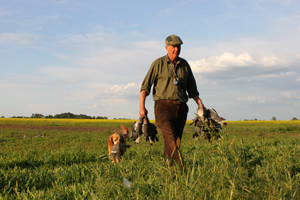 A decision by the board of Natural England to reject a requirement which would have meant pigeon shooters might have to prove that they have tried to scare birds away from agricultural crops before shooting has been welcomed by the UK’s largest shooting organisation, the British Association for Shooting and Conservation (BASC).
A decision by the board of Natural England to reject a requirement which would have meant pigeon shooters might have to prove that they have tried to scare birds away from agricultural crops before shooting has been welcomed by the UK’s largest shooting organisation, the British Association for Shooting and Conservation (BASC).
The proposal was contained in one of the most wide-ranging reviews of general licences ever undertaken in England. General licences allow the necessary control of designated species in order to allow crop protection or for other reasons such as conservation, the preservation of air safety or food-supply security.
BASC chairman Alan Jarrett said: “The Natural England board has taken a broad common-sense view of the numerous suggested changes and we welcome their practical approach, particularly in abandoning the proposal to “shoo before you shoot” and not introducing an arbitrary reclassification of hooded and carrion crow. General licences, which provide specific exemptions from the blanket protection of all bird species, are fundamentally important.
“I would like to thank BASC members who took the time to submit their own responses to Natural England during the consultation process. Natural England received more than 2,000 responses. It is very important that the voice of people who rely on the general licences from day to day is heard by those responsible for regulation.”
Natural England had sought views on 65 separate questions which covered a broad sweep of different issues. One of the main concerns was that the burden of proof for people shooting pigeons would have shifted from the individual being “satisfied” that methods other than shooting would be ineffective, to having to demonstrate that they had tried alternative methods. Pigeons are the UK’s number one agricultural pest and the only effective way to protect growing crops is to shoot pigeons which are feeding on them.
Jackdaws, jays, hooded crows and collared doves will remain on the general licence for agricultural protection. The Egyptian goose will be added to the licence allowing control for agricultural protection and air safety. Greylag geese will not be added to the agricultural licence but will be added to the licence for air safety. Further requirements which would have increased bureaucracy, such as insisting that people must have read and understood a licence, or have it read to them, have been dropped.
The Natural England board has deferred decisions on a number of important issues, including a range of proposals affecting trapping and monitoring and reporting requirements. BASC will continue to engage with Natural England to ensure that all decisions meet the Government’s policies on better regulation and evidence-based decision making.
Richard Ali, BASC chief executive, said: “BASC remains committed to ensuring that the principles of better regulation are followed. All regulation should be proportionate, accountable, consistent, targeted and transparent. We believe there is still scope for red tape to be reduced and for the general licences to be simplified to make them more effective. We will continue to press for such changes to be made.”
Ends
More details of the consultation response can be seen on the Natural England website: http://www.naturalengland.org.uk/